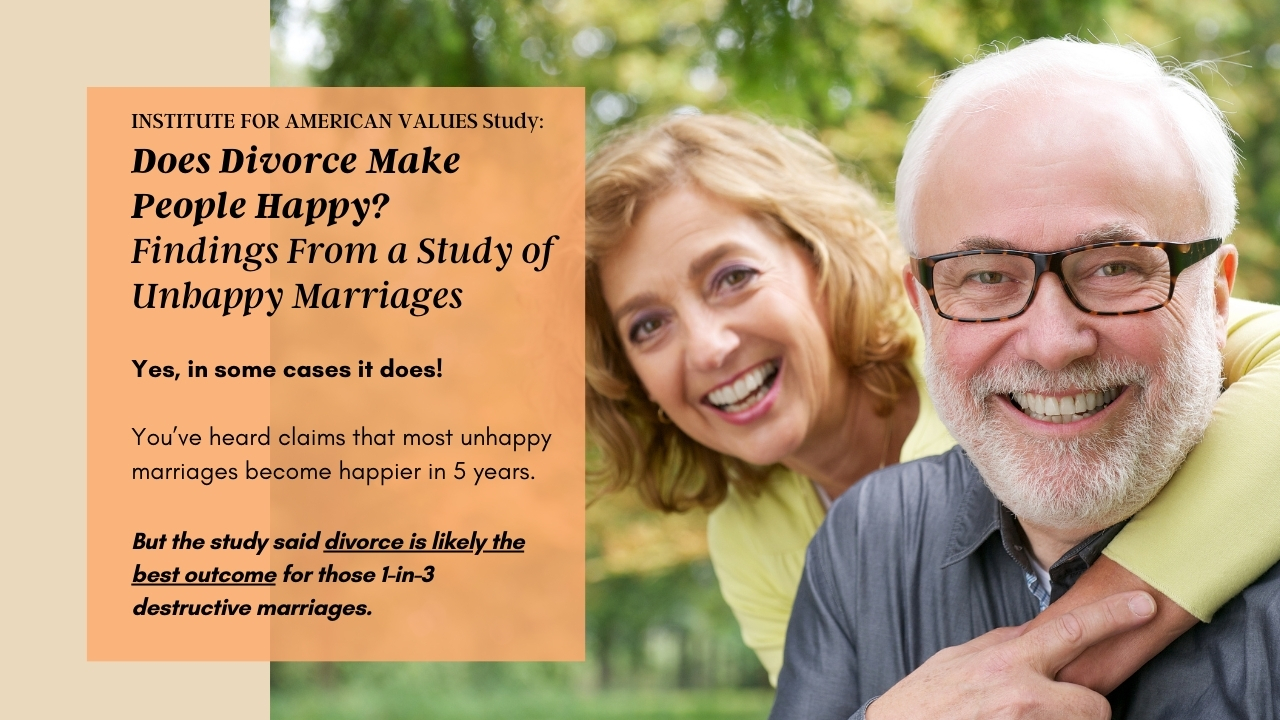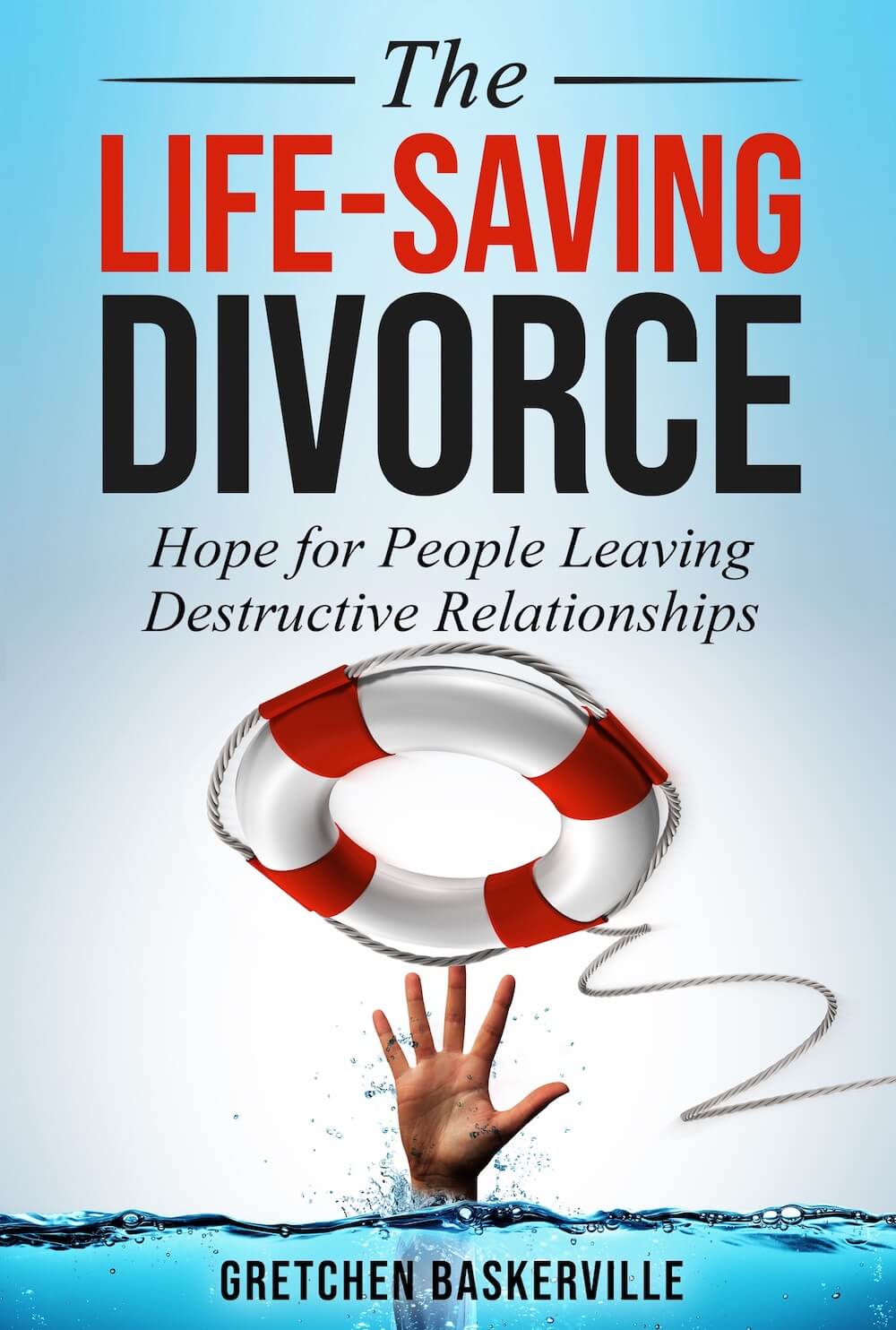Many people like to quote the study “Does Divorce Make People Happy?” from The Institute for American Values, proudly claiming, “Two out of three unhappily married adults who avoided divorce or separation ended up happily married five years later.”
When this study was released in 2002, marriage-at-any-cost leaders eagerly jumped on it, using it to tell abuse victims that if they just stuck it out, their marriages would magically get better. They also painted divorce as an easy (and foolish) choice for people who gave up too soon, suggesting those who divorced were selfish quitters who couldn’t hold out even five years.
But they didn’t stop there. They even told victims of abuse things like:
- “Your unhappy marriage will get better if you just stay for five more years.”
- “Divorce will only make you miserable.”
- “People who divorce are immature for not waiting it out. And they lack faith in God.”
Here’s the problem: many of those pushing this narrative either didn’t read the actual study, or if they did, they ignored the real findings. Dr. Waite, the study’s author, made it clear more than seven times that abusive and toxic marriages are unlikely to become happy. In fact, she showed that for many people, leaving dangerous or damaging relationships leads to more happiness.
Staying in a bad marriage for five years won’t magically fix serious problems like cheating, physical or emotional abuse, severe addictions, abandonment, or neglect. Sometimes, leaving is the only way to protect your happiness—and your safety.
THE TRUTH ABOUT DESTRUCTIVE MARRIAGES
Organizations like Focus on the Family love to push the idea that if you just stick it out, almost every marriage will eventually get better. They often quote the 2002 Institute for American Values study and Dr. Waite’s 2003 book, claiming that people who divorce will always end up unhappy.
But they’re wrong! The study actually found the opposite: people in destructive marriages are better off divorcing, and 81% of those who divorced and remarried during the study were happier in their second marriage.
Yes, you might have heard this quote from the study: “Almost two-thirds of unhappy spouses who stuck with the marriage forged happy marriages down the road.” But what’s left out is that one in three never became happy. That’s a huge number of people stuck in miserable marriages!
In fact, in the very last sentence of the study, it says divorce is often the best choice:
It admits that “…some marriages are so destructive that divorce or separation is the best outcome,…” (Does Divorce Make People Happy?, p. 33).
NOT EVERY MARRIAGE WILL GET BETTER
Here’s another quote from the study:
“Marriages with high conflict and domestic violence were less likely to become happy five years later” (p. 11-12).
Translation? If your marriage is full of conflict or abuse, it’s not going to magically get better. You can predict ahead of time which marriages might improve—and violent ones aren’t likely to be in that group.
YES, DIVORCE PROVIDES RELIEF AND SAFETY. THAT’S HAPPINESS.
“If the problem is marital violence, divorce appears to offer significant relief” (p. 12).
For people in violent marriages, divorce is often a lifesaver. It’s a way out of harm, and the relief that comes with leaving that kind of relationship can’t be overstated.
“When an unhappily married adult experiences violence, divorce and remarriage significantly reduce the likelihood he or she will experience domestic violence” (p. 12).
Divorce and remarriage dramatically reduce the risk of facing violence again. Clearly, getting out of an abusive marriage may be the right call.
In fact, the study’s research shows that 81% of those who divorced and remarried were happy in their second marriage:
“24 percent of those unhappy spouses who divorced or separated ended up in a second marriage within five years. Eighty-one percent of those second marriages were happy” (p. 12).
DIVORCE CAN IMPROVE WELL-BEING
Now, not every divorce leads to happiness for everyone. But in cases of marital violence, divorce does result in increased well-being:
“Divorce failed, on average, to result in improvements in psychological well-being for unhappy spouses. With the important exception of reducing the incidence of marital violence…” (p. 13-14).
In short, if your marriage is abusive, divorce can make you happier by removing the danger.
SOME MARRIAGES IMPROVE WITH OUTSIDE STRESSORS
Dr. Waite also notes that some marriages improved when outside stressors—like job loss or illness—caused the problems, not bad behavior by one spouse:
“Spouses became ill, lost jobs, got depressed, children got into trouble or created marital stresses by their financial and emotional demands” (p. 15).
But when one spouse’s character or behavior—like cheating, violence, or addiction—was the problem, those marriages did not improve.
DIVORCE CAN BENEFIT CHILDREN IN HIGH-CONFLICT HOMES
Now, what about the impact of divorce on kids? Dr. Waite and co-author Maggie Gallagher agree with researchers Paul Amato and Alan Booth that while divorce can be tough, it’s better for kids in homes full of conflict. In fact, divorce is beneficial for children in 3 in 10 cases: (Source: The Case for Marriage (p. 147). Crown. Kindle Edition.)
MISERABLE MARRIAGES CAN DESTROY YOUR HEALTH
Finally, a 2005 study took an even deeper look at unhappy marriages that had gone on for at least twelve years. They used the same data as the 2002 study. Their findings were eye-opening:
“Remaining unhappily married is associated with significantly lower levels of overall happiness, life satisfaction, self-esteem, and overall health… Staying unhappily married is more detrimental than divorcing” (Hawkins and Booth, Unhappily Ever After, 2005).
In other words, staying in a miserable marriage can wreck your health and happiness. Divorcing and starting over can improve your life in almost every way. Even researcher Dr. Mavis Hetherington noted that women who left hostile or distant marriages saw major health improvements:
“The one striking exception to the otherwise general rule about postdivorce decline in health were women who had been in distant or hostile marriages” (For Better or For Worse, 2002, p. 59).
THE BOTTOM LINE: SOMETIMES, DIVORCE IS THE BEST CHOICE
The bottom line? Staying in a destructive marriage isn’t always the right choice. Divorce might be the best way to reclaim your happiness, health, and safety.



 :
:
 Buy PDF
Buy PDF